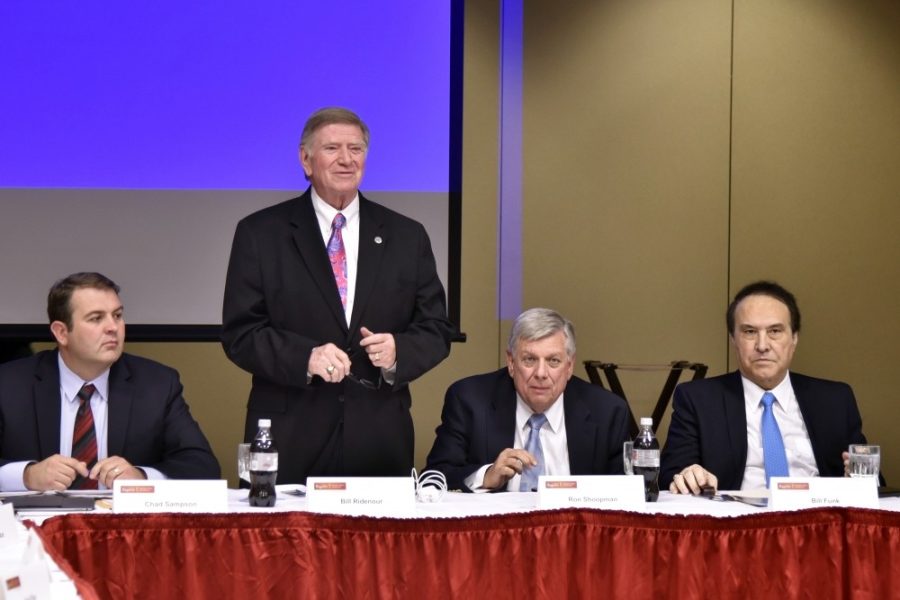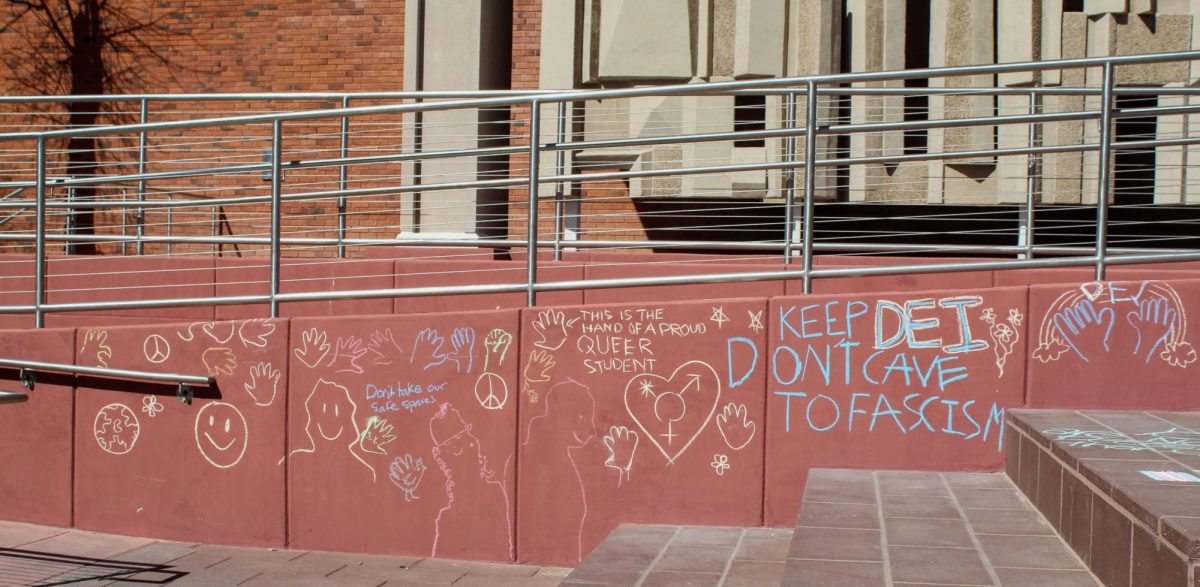The search for the 22nd president of the UA has been conducted by one of the most prolific headhunting firms in the country, one with a reputation for keeping information confidential.
These headhunters, usually referred to in legal terms as executive search firms, help create a pool of prospects for the search and work to entice the would-be contenders to seriously consider the job.
One of these executive search firms, R. William Funk and Associates, was hired by the Arizona Board of Regents to assist a search committee with selecting the next UA president.
Headhunters have been around since at least the 1950s and are used to recruit people in high-profile positions in the public and private sectors.
Researchers Judith Wilde and James Finkelstein at George Mason University’s Schar School of Policy and Government said that about 75 percent of public university presidential searches were conducted using headhunters during the 2015-2016 academic year, and this is a trend that is not expected to slow down in the near future.
RELATED: Campus concerns surround secrecy of search for next UA president
There are many reasons why these firms—that most people on campus have never heard of—are now so ubiquitous in higher education.
Many people involved in these searches repeat the mantra that using a search firm is the only way to get the best candidates.
“We have been advised by our search consultant that [a public search] is not the best way to get the quality candidate and to get the president that the UA needs,” said Regent Bill Ridenour, chair of the UA Presidential Search Committee. “Public searches are not going to attract the best candidates.”
Funk and Associates would not talk to the Daily Wildcat due to their current contract with the regents.
Jan Greenwood, co-owner of Greenwood/Asher and Associates, a search firm that focuses on education, is a little more enthusiastic about the power of search firms.
Boards and committees use search firms “to get the best candidates in the world,” Greenwood said.
On the other hand, according to Finkelstein, there is no research showing search firms produce better candidates.
“You do kind of get a sense of [search firms] being a bit of a racket,” said Arizona Sen. David Bradley. “I think the necessity to search the country for the ideal candidate is overblown. I think that we have the talent here in Arizona.”
Many of these firms started developing specializations in higher education in the 1980s and it has become an industry in its own right since then.
Greenwood said the rise in search firms started in the early 1990s after a sitting president of a university was fired for considering a position at a different university. As a consequence, universities opened the floodgates and allowed search firm to drench the process in confidentiality to protect candidates.
Greenwood said she couldn’t name the university or president, but the information is common knowledge in the industry.
The Wildcat investigation did find one case like this. When asked if she knew of other cases Greenwood said, “I do. But I cannot say it. The market certainly knows.”
According to Greenwood, at least two other presidents have lost major funding from donors after openly considering moving to different universities, but again she could not name the universities involved because of confidentiality. The Wildcat has not been able to independently confirm these incidents.
Despite Greenwood’s assertions, research suggests there isn’t enough information to draw any substantial conclusions about the necessity or value of search firms.
“We haven’t actually seen evidence of any of that,” Wilde said. “But what we do see is that, by having confidential searches, it makes it easier for the search firms to have a big Rolodex that they can keep using.”
In other words, search firms directly benefit directly from having a confidential search process.
“I think the driving force behind this secrecy has been these search firms. They want to protect their own candidates for their own commercial reasons,” said Frank LoMonte, executive director for the Student Press Law Center. “This is all about protecting the business model of these private search firms.”
According to Finkelstein and Wilde, the average cost to a university using a headhunter firm is close to $80,000. Funk and Associates are being paid a $150,000 fixed fee for the UA president search, not including costs such as travel fees.
“Remember these companies operate for the purpose of generating a profit,” Finkelstein said. “These companies are not in business just to do good.”
Ridenour said the board made the right choice in hiring the search firm.
“We’re of the opinion that it’s worth every cent to contract with an outside adviser for the expertise that they bring to the search process,” Ridenour said.
The expertise that Ridenour is talking about is the firm’s extensive contacts.
These firms know many of the potential candidates that are on the job market and have the time to go meet with them in other states if necessary.
Yet, according to Wilde and Finkelstein, these searches used to involve a lot of faculty, who could find great people at a fraction of the cost.
Ridenour considers this to be a focal point for the next president.
“Because of the horrible cuts that the state has made, revenue generation has got to be a critical skill,” he said.
This focus on revenue generation has created what the GMU researchers call “CEOization.” The boards and committees have a lot more corporate influence than they formerly had, and the presidents that they choose reflect this shift, said GMU researchers.
“They look and behave much more like the CEO of a corporation than the leader of an academic institution,” Finkelstein said.
RELATED: UA presidential search committee begins discussions with prospects
Funding is a serious problem for universities today. According to Bradley, resources for universities at the state level have been cut by 56 percent since the financial crash in 2008. Although the economy has improved since then, Bradley doesn’t expect funds will make their way back to education any time soon.
“Because we’ve done a lot of simultaneous corporate tax cuts and other things like that, it’s made it difficult to restore funding to the universities and also community colleges and K-12 as well,” he said.
This has had the effect of displacing the faculty from playing a larger role in the search process.
“For faculty and everybody at the university the most important thing they do is identify a president,” Wilde said. “Yet they’re outsourcing this important responsibility.”
Now, the campus visit, made by a group of finalists, has become the last foothold for faculty and the campus community to have a word in the selection of the next president. However, the UA might be losing this tradition as well.
“I would say it’s unlikely,” Ridenour said.
He said chances are only a single finalist will be brought to the university.
Ridenour did make it clear that the board could still decide to have a group of finalists visit campus.
Most faculty and students the Wildcat has talked with expressed interest in a campus visit by all the finalists.
“What we’re hoping for is when they narrow it down, there will be campus visits with the finalists and open sessions,” said Steven Schwartz, chairmen of the Committee of Eleven,
Yet, Lynn Nadel, chair of the faculty, who is on the search committee, has accepted this change in the process.
“What I believe is not relevant,” Nadel said. “This is the process and we have to make the best of it.”
This is another belief that the search firms hold to be absolutely true.
“The board can’t be in a position where process trumps finding the very best,” Greenwood said. “When it comes right down to it, finding the best is what it’s all about.”
However, not everyone believes a closed process is the best way to find the most qualified candidate.
“By having an open vetting process, it can eliminate problems that the hiring committee misses,” said David Cuillier, director of the UA School of Journalism. “I think it’s a big mistake to make such an important decision in secret.”
Students are also finding the lack of information hard to cope with.
“That kind of speaks for itself, how little students know about it in the first place,” said Cole Pihl, co-director of Students for Sustainability. “It seems so closed, and that’s very frustrating.”
Due to declining funding and a stronger corporate culture, universities are undergoing a transformation that has effects that go beyond higher education.
“We need to take a step back and make certain that the changes that we’re promoting are not only in the best interest of the institution, but in the best interest of society,” Finkelstein said.
Follow J.D. Molinary on Twitter.









